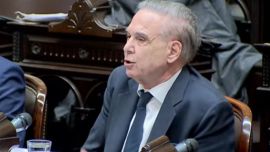Deputies in the lower house have given the first seal of approval to President Javier Milei’s sweeping reform bill, a rare legislative boost for his budget-slashing agenda.
After a marathon session that went right through Monday night, the Chamber of Deputies approved what remains of Milei's flagship "omnibus" reform bill with 142 votes against 106. There were five abstentions.
"This is a fundamental first step towards getting Argentina out of the quagmire it has been in for the last few decades," Milei said in a post on his X social media account.
The President said that Argentina is moving ever closer to "a new era of prosperity."
Minutes later, a communiqué from the President's Office was released hailing "the patriotic work of the National Deputies who collaborated in its drafting, defended the law on the floor, and supported with their vote the reforms that our country needs."
Lawmakers have provisionally approved what remains of Milei's flagship ‘omnibus’ reform bill.
Specific chapters and articles are being voted on point-by-point, meaning the final text of the mega reform bill is still not known.
Deputies must also vote on a fiscal package of over 100 articles which was discussed in parallel. Contained within that chapter is the restoration of income tax for high-income earners and a ‘blanqueo’ tax amnesty scheme allowing the regularisation of undeclared assets up to a value of US$100,000.
If approved, both bills must still travel a thorny road in the Senate, where the ruling La Libertad Avanza party has only seven of the 72 seats.
The ‘Ley de bases y puntos de partida para la libertad de los argentinos’ includes some 230 articles – down from the initial 600-plus rejected by lawmakers who sent the government back to the drawing board in February.
The bill includes the greenlighting of Milei's declaration of a one-year economic emergency, approving powers allowing the president to dissolve state agencies, and the possible privatisation of around a dozen public companies, including state-owned carrier Aerolíneas Argentina.
The package also includes “labour modernisation” rules, through which severance pay is trimmed and probationary periods are extended.
It also includes state reform and introduces changes to social security rules. Elimination of universal access to the minimum pension payment was approved.
The provisions also envision tax, customs and foreign exchange incentives to encourage investment in the economically crisis-ridden country.
"I'm going to be 72 years old [soon] and I've never experienced anything like this,” complained demonstrator Guillermo Vidales as protested outside the National Congress building.
The changes would “run this great country that has everything,” the pensioner added.
“What the Government is doing is basically selling the homeland, ruining the population … it turned out that the caste was the people”, said Manuel Crespo, a 29-year-old teacher who also joined the demonstration.
The bill, “in addition to being an attempt at a constitutional reform, is a plan for businesses,” complained Peronist deputy Cecilia Moreau during the debate.
Left-wing lawmaker Myriam Bregman described the bill as a “travesty,” saying the new rules would “facilitate the dismissal of dozens and dozens of workers.”
Ruling party deputy José Luis Espert defended the reforms, defining its fiscal chapter as “the first step towards a more reasonable tax system which will help, in time, to lower taxes and fight against poverty.”
Margarita Stolbizer, a centre-right lawmaker, said during the debate that the new version of Milei's "omnibus" bill was "much more reasonable."
"We recognise that there is an emergency, it would be foolish not to recognise it. We accept that the Executive branch will ask us for tools to deal with this crisis," she said.
Self-declared "anarcho-capitalist Milei won Argentina’s presidential election last November vowing to take a chainsaw to public spending and reduce the budget deficit to zero.
By decree, he has cut the Cabinet in half, slashed tens of thousands of state jobs, suspended public works contracts and ripped away fuel and transport subsidies even as wage-earners lost a fifth of their purchasing power and annual inflation approached 290 percent.
Poverty affects six out of every ten people, according to a recent study.
Last week, Milei hailed the economic crisis-riddled country's first quarterly budget surplus since 2008 and warned struggling Argentines not to "expect a way out through public spending."
In Congress, where Milei's party is a minority in both houses, things have not gone his way. Tuesday’s general approval is his first major legislative victory, though the Senate could still send the bill back to the drawing board.
After his first run at the omnibus bill got thrown out in February, the Senate in March rejected a so-called "mega-decree" that sought among other things to abolish rent caps and relax labour laws.
For political analyst Gabriel Vommaro, the passage of the second version of the bill is a response to the fact that Milei "is discovering how difficult it is to govern in general and how complicated it is to govern Argentina.”
“He understands that he needs to be more pragmatic,” he added.
Milei's popularity is currently hovering around 50 percent, polls concur. Support "is maintained because political polarisation is maintained, and therefore there is nowhere to go outside this structuring of the political space," said Vommaro.
Protesters repudiated the bill in front of Congress until late on Monday night, and more did the same on Tuesday, gathering to supportf rallies called by trade unions and opposition parties.
Trade unions have called for a demonstration on May 1, International Workers’ Day, against the proposed labour reform and government austerity measures.
The main umbrella union group has also called for a national strike for May 9, the second since Milei was inaugurated in December.
On April 23, thousands of people marched against the underfunding of state universities.
Argentina has been in a severe economic and social crisis for a few years now. Milei promised to overcome it, but at the expense of great sacrifice. Even though he has achieved a fiscal surplus, the country now suffers from the plummeting of consumption and industry.
The International Monetary Fund estimates that the economy will contract 2.8 percent this year, with inflation remaining high at around 150 percent.
– TIMES/AFP



















Comments